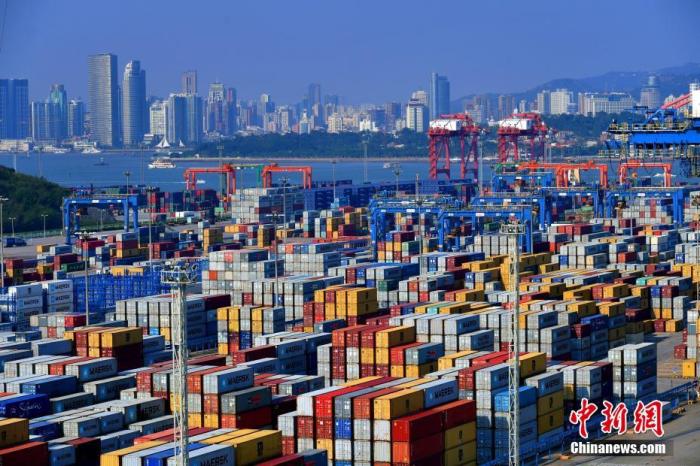China News Service, Beijing, February 20th (Reporter Li Xiaoyu) More and more foreign companies are coming to "Nuggets", with an average of more than 400 million US dollars of foreign capital pouring into China every day; "Manufactured" mobile phones and computers are sold in many countries... Today, the degree of China's close connection with the world and the influence of China's economy on the global economy are no longer the same as ten years ago.
Data map: Xiamen Port Haicang Container Terminal.
Photo by China News Agency reporter Wang Dongming
Scholars in Beijing believe that the main reason behind this change is that China has been steadily deepening its reform and opening up since 2012.
In the past ten years, a market environment that is more conducive to mobilizing the enthusiasm and creativity of all parties has gradually taken shape, and China's economic potential has continued to be released.
Continue to streamline administration and decentralize power, reduce cumbersome administrative approvals, and fully implement a nationally unified negative list for market access, so that enterprises of different ownerships can truly compete on the same stage; reform and improve the evaluation mechanism for scientific and technological achievements, and build government, social organizations, enterprises, investment and financing institutions A multi-evaluation system involving joint participation, so that scientific researchers no longer have to be troubled by the problem of "only papers, only professional titles, only academic qualifications, and only awards"... Various reform measures have shown the vitality of China's economy.
According to official data, in 2021, the total number of market entities in China will exceed 150 million, including more than 40 million enterprises and 100 million individual industrial and commercial households.
During the same period, among the industries above designated size, the added value of state-controlled enterprises, joint-stock enterprises, private enterprises, foreign-invested enterprises and enterprises invested by Hong Kong, Macao and Taiwan enterprises all increased by 8% to 10.2% compared with the previous year.
Niu Xianfeng, a professor at the National School of Administration, said that the purpose of the reform is to form a mature and stereotyped system, giving people a stable expectation, allowing people to give full play to their potential, let go of their hands and feet, and pursue careers and development.
In recent years, China's reforms have given full play to the positive incentives of the system, providing institutional guarantees for stimulating the vitality of various social entities.
In the past ten years, an open economic system aimed at effectively utilizing two markets and two resources at home and abroad has been accelerated. As a result, China has become more deeply integrated with the world.
From the establishment of pilot free trade zones and free trade ports, to the introduction of foreign investment laws and implementation regulations, and the full implementation of the pre-entry national treatment plus negative list management system; Signing the Regional Comprehensive Economic Partnership (RCEP) and seeking to join the Comprehensive and Progressive Trans-Pacific Partnership (CPTPP). Become a major "stabilizer" of globalization.
Zhang Yuyan, director of the Institute of World Economics and Politics of the Chinese Academy of Social Sciences, said bluntly that the global supply chain is now showing signs of evolving in the direction of de-globalization, but the data related to China clearly provides a counter-example. The reason is that China is persistent and firm open policy.
In January this year, China's foreign investment increased by 11.6% year-on-year, nearly three times the growth rate of the same period last year.
"Now we have enjoyed the same treatment as Chinese companies, which makes us more willing and confident to invest in China." Chen Jiayuan, CEO of Louis Dreyfus North Asia, said in an interview with a reporter from China News Agency.
In the past decade, China has achieved "a higher level" in the world's unprecedented changes in a century by virtue of its reform and opening up.
In the next decade, China will be faced with a more complex internal and external environment, and how the reform and opening up will reach a higher level will arouse the attention of many parties.
Niu Xianfeng said that in order to seek development in a more unstable and uncertain world, China needs to strengthen the system, integrity and coordination of reforms in the future, so as to prevent multiple policies and policy effects from offsetting each other.
We should firmly grasp the key point of economic system reform, and further stimulate the enthusiasm of various market players and factors to create wealth.
Long Guoqiang, deputy director of the Development Research Center of the State Council of China, said that under the new situation, China needs to further play the role of mutual promotion between reform and opening up, and promote reform through opening up.
The economic system should be brought into line with international high-level economic and trade rules by participating in the negotiation of high-level free trade areas or investment agreements.
In addition, the role of platforms such as special economic zones should be brought into full play to explore replicable and popularized experiences for high-level reform and opening up.
(over)

